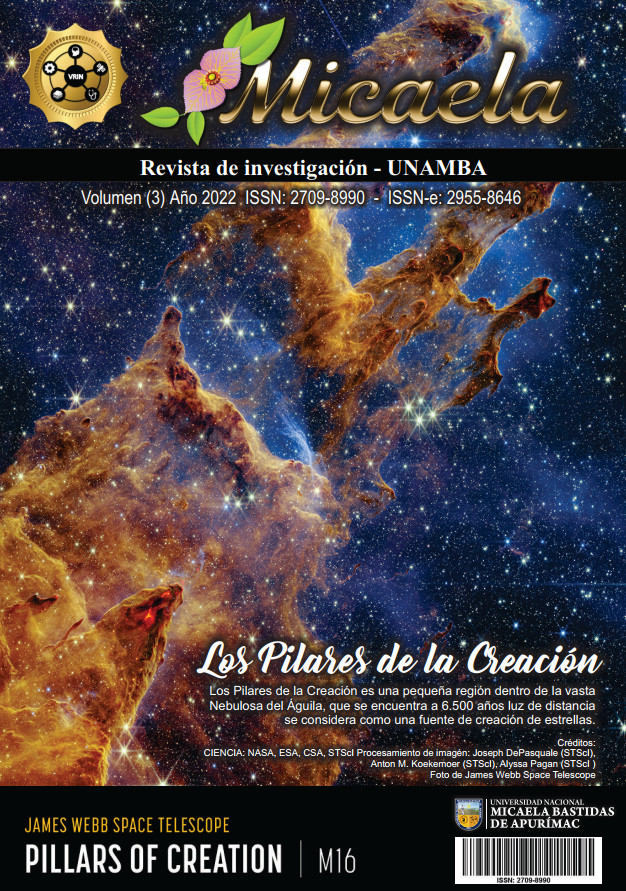Motivational strategies in remote teaching during the Covid-19 pandemic in administration students from the department of Apurimac
Main Article Content
Abstract
The threat of Covid-19 put various agents such as the state, companies and individuals in a bind. The education sector highlighted the existing gaps related to technological infrastructure and connectivity, however, given the situation, higher education institutions were forced to implement remote teaching with the resources they had. This academic paper was directed with the purpose of determining the association between motivation strategies and learning in remote teaching in Administration students. the description of the problematic situation is carried out following the criteria of the deductive method. Methodologically, it was developed under the correlational scope, cross-sectional non-experimental design. The sample was non-probabilistic of 75 students. Confirmation of the statistical assumption was corroborated by Pearson's Chi-square statistic supplemented with Somers' d. It was obtained that the motivation strategies, before, during and after the class, positively contributed to the learning of the students in remote teaching. However, more than 40% of the students indicated that the remedial teaching was slightly and moderately effective for effective learning.
Article Details

This work is licensed under a Creative Commons Attribution-NonCommercial-ShareAlike 4.0 International License.
Los nombres y las direcciones de correo electrónico introducidos en esta revista se usarán exclusivamente para los fines establecidos en ella y no se proporcionarán a terceros o para su uso con otros fines.
How to Cite
References
K. S. Vera Quezada y D. A. Arce Conde, «Efectos multidimensionales emergentes de la cuarentena como consecuencia del covid-19 en los estudiantes universitarios de Bolivia,» Ciencia Latina Revista Científica Multidisciplinar, vol. 5, nº 2, pp. 1326-1340, 2020. https://doi.org/10.37811/cl_rcm.v5i2.330
I. Chiavenato, Comportamiento Organiozacional, 2 ed., McGrawHill, 2009.
E. Soto, Comportamiento organizacional: O Impacto das Emoções, São Paulo: Thomson, 2002.
Escuela Nacional de Administración Pública, «De la clase presencial a la enseñanza remota,» Autoridad Nacional del Servicio Civil, [En línea]. Available: https://aulavirtual.enap.edu.pe/course/view.php?id=325. [Último acceso: 15 Junio 2022].
J. Valenzuela, C. Muñoz y A. Montoya Levinao, «Estrategias motivacionales efectivas en profesores en formación,» Educaçao e Pesquisa, vol. 44, 2018. https://doi.org/10.1590/s1678-4634201844179652
J. L. Rodríguez Diéguez, Estrategias de enseñanza y aprendizaje, Madrid: UNED, 1993.
S. J. Tijo López, Enseñanza remota de emergencia en Ingeniería Civil: Lecciones aprendidas, EIEI ACOFI, 2020. https://doi.org/10.26507/ponencia.781
J. König, D. J. Jäger-Biela y N. Glutsch, «Adaptación a la enseñanza en línea durante el cierre de las escuelas por la COVID-19: efectos de la educación y la competencia docente entre los docentes al comienzo de su carrera en Alemania,» Revista Europea de Formación del Profesorado, vol. 43, nº 4, pp. 608-622, 2020.
C. Hodges, S. Moore, B. Lockee, T. Trust y A. Bond, «La diferencia entre la enseñanza remota de emergencia y el aprendizaje en línea,» Reseña Educause, 2020.
F. G. Arias, El proyecto de investigación, 7 ed., Episteme, 2016.
S. Palella Stracuzzi y F. Martins Pestana, Metodología de la investigación cuantitativa, FEDUPEL, 2012.
L. V. Alaya Urrutia, «Estrategias motivacionales y su influencia en el rendimiento académico de los alumnos del curso de Introducción al Derecho de la Facultad de Derecho de una universidad privada de la ciudad de Arequipa-2020,» UTP, Lima, 2021.
H. A. Cuesta Cotto, «Estrategias motivadoras y su aporte al aprendizaje colaborativo,» Universidad Técnica de Babahoyo, Babahoyo, 2021.






